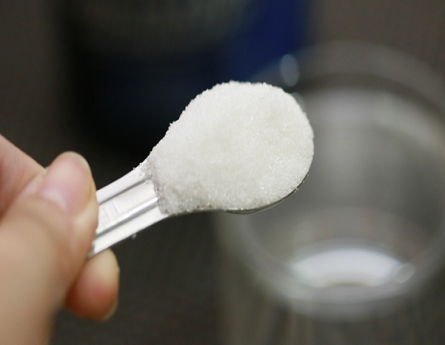Beyond the Gym: Surprising Benefits of Creatine Monohydrate for Women
 Creatine monohydrate is a popular sports supplement among gym goers and fitness enthusiasts looking to boost their performance and build lean muscle. As one of the most researched and time-tested forms of creatine, it’s widely recognized for its effectiveness, safety and affordability.
Creatine monohydrate is a popular sports supplement among gym goers and fitness enthusiasts looking to boost their performance and build lean muscle. As one of the most researched and time-tested forms of creatine, it’s widely recognized for its effectiveness, safety and affordability.
What Is Creatine Monohydrate and How Does It Work?
Creatine monohydrate is a dietary supplement made from creatine, a natural substance found in your body (mainly in the muscles) and in foods like red meat and fish. The term monohydrate means that the substance has been combined with a water molecule.
This supplement works by helping the muscles produce more ATP (adenosine triphosphate), which is the body’s main source of energy during high-intensity exercise. This, as a result, allows you to lift heavier, train harder, and recover faster.
But here is what many women don’t know: the benefits of creatine monohydrate go far beyond the weight room. Not all supplements are created equal, but the best creatine monohydrate for women supplements can help the body adapt to hormonal changes, support bone health, boost mood and cognitive function and even help improve sleep.
So, if you thought that this was just another bulking supplement for men, you should consider giving it a second look.
Benefits of Creatine Monohydrate Supplements for Women
To enjoy the full effects of this supplement, you must choose a high-quality product. That said, the best creatine monohydrate for women is one that’s pure, free from unnecessary additives and tested for safety and quality.
Products packed with fillers, sweeteners, artificial colors, or other additives could do you more harm than good. In addition to minimizing the effectiveness of the supplement, these substances can also lead to unpleasant side effects like bloating, digestive discomfort and even spikes in blood sugar.
Help the Body Adapt to Hormonal Changes
Hormonal changes, such as menstruation, pregnancy and menopause, can impact the body’s ability to produce creatine. This explains fatigue and decreased energy levels during these times. Supplementing with creatine helps fulfil the body’s creatine stores, restoring energy levels.
Hormonal changes can also lead to a decline in muscle mass and strength, particularly during menopause, due to reduced estrogen. By supporting muscle energy, creatine supplements also help with protein synthesis and recovery, helping to preserve muscle mass, strength and physical performance.
Support Bone Health
Combined with resistance or weight-bearing exercise, using this supplement can help support bone health in women. Research has shown that stronger muscles exert more mechanical load on bones, helping stimulate bone formation. When paired with resistance training, creatine supplementation helps increase muscle strength and lean mass, leading to improved mechanical stress on bone.
Bone loss can also happen due to chronic low-grade inflammation and oxidative stress in postmenopausal women. Research suggests that creatine also has antioxidant and anti-inflammatory properties that could help protect bone cells and support healthier bone remodeling.
Boost Mood and Cognitive Function
As mentioned above, creatine helps the body to produce more ATP (adenosine triphosphate). This energy molecule is used by all cells in the body, including neurons.
The brain is one of the most energy-demanding organs in the body. Under stress, fatigue, or when dealing with hormonal fluctuations, its energy needs increase. By enhancing the brain’s energy supply, creatine helps support better focus, sharper thinking and improved overall cognitive performance.
Mood regulation is another area these supplements tend to help with. Creatine has been shown to influence the function of neurotransmitters like serotonin and dopamine, both of which play key roles in regulating mood. In studies, creatine supplementation has helped reduce symptoms of depression and even enhance the effectiveness of antidepressant medications.
Improves Sleep
By increasing the energy reserves in the brain, creatine helps enhance recovery during sleep and reduce the grogginess often felt upon waking. Its effect on neurotransmitters like serotonin also helps stabilize mood. Together, all this helps promote a more relaxed mental state that supports better sleep quality and improved alertness the next day.
Are There Any Negative Effects of Creatine?
When used as recommended, this supplement is generally considered safe for women. However, like with other supplements, it can have some potential side effects. Still, they tend to be mild and rare.
One of the most commonly reported effects is water retention. Creatine tends to draw more water into the muscle cells, which could cause a slight increase in body weight or a feeling of bloating. Some women may find this uncomfortable, especially early in supplementation.
In rare cases, some women may experience digestive discomfort, such as nausea, cramping or diarrhea. These effects can usually be avoided by taking smaller doses and staying well hydrated.
Why Drink More Water with Creatine?
When supplementing with creatine, it’s important that you drink plenty of water. Creatine pulls water into the muscle cells to help with energy production and muscle function. This natural process can slightly reduce the amount of water available for the rest of your body, potentially increasing the risk of dehydration.
Staying well-hydrated helps your body maintain fluid balance, supporting kidney functions while optimizing the effectiveness of the creatine itself. Drinking plenty of water also helps reduce the chance of muscle cramps or digestive discomfort.
What Is the Correct Way to Start Taking Creatine?
The best way to start supplementing with creatine is to take 3 to 5 grams per day. This will allow your muscles to gradually saturate while minimizing the risk of bloating or stomach discomfort.
Take the supplement daily, even when you don’t exercise. Consistency is key to maintaining elevated creatine levels in your body. You can mix it with water, juice, or a smoothie, ideally with a meal to aid absorption.
It tends to take 2 to 4 weeks for one to start noticing the benefits of the supplement, like increased energy, improved strength or enhanced mental clarity. Pay special attention to how your body responds and consult a healthcare professional in case you have any health conditions or concerns.

